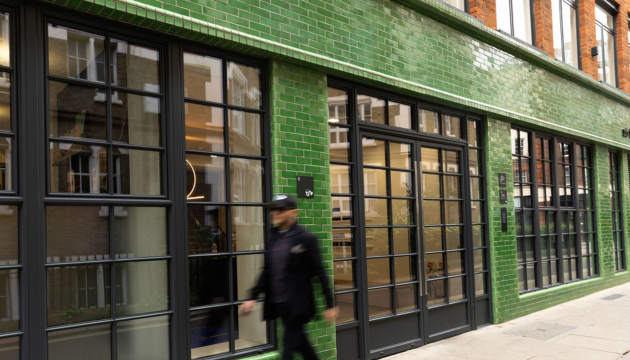TSP founder Zac Goodman is preparing a new investment platform he says will let him swoop on “overlooked, underappreciated” assets.
By Chanté Bohitige, as featured in The EG Interview
–
As a six-time winner of Channel 4 quiz show Countdown, Zac Goodman is used to solving puzzles. In his day job running real estate investor and developer TSP, he faces an even trickier conundrum – how to revamp some of London’s oldest office stock.
“You only have to walk down the street and see 200-year-old buildings to know that they still stand the test of time, and we should respect and revere that in our industry,” Goodman tells EG.
“We call our strategy ‘Re-throning Great Dames’. Most of the buildings that we buy are 100 years old: what’s fun is unpicking those and bringing them back.”
The strategy is working. In 2019 TSP bought 30 Lighterman, a Victorian former warehouse in King’s Cross, N1, for £12m. His team improved the building’s sustainability credentials and energy efficiency, added a host of smart features and sold it in December for £17m.
Now, Goodman is preparing to launch a new investment platform to mark “our first big portfolio play”.
EG caught up with the self-described real estate “magpie” to talk about what he hopes to swoop on next.
Big cheese
Goodman started his career as a foreign exchange trader at Goldman Sachs but found corporate life unfulfilling. “I was the kid that was selling stuff at school, whatever I could lay my hands on. I was a bit of an entrepreneur at a young age,” he says. “The corporate life wasn’t for me. I don’t regret it, but I wanted to run my own business.”
At 25, five years into his investment bank career, a friend recommended that Goodman read Who Moved My Cheese, Spencer Johnson’s self-help book about embracing change in work. The effect was almost immediate.
“I read the book and quit my job,” he says.
It was 2009, the world just starting to look beyond the great financial crisis. Another friend, Yonni Abramson, was looking for a fresh challenge having recently left a role at a property fund, and suggested they team up on a real estate venture.
“We were 25 and no one wanted to lend us any money,” Goodman says. “So we thought, we’ll work for a few years, we’ll do clever stuff and take advantage of some of the arbitrage that was in the fallout of the Great Recession.”
The firm focused on charities as office occupiers, advising on rents and then developing a business around property management. By 2013 the team had shifted into investment, buying Pear Tree Court in Clerkenwell, EC1, out of receivership. “We were in and out within the first nine months,” Goodman says of the refurbishment project, which returned his investors “a very hefty profit”.
The pair caught the buzz. “It was a bit like when you go into a casino for the first time and win – there’s probably a slight level of danger in that,” Goodman says.
Their business, NorthHill, transacted about £500m of deals in the next few years, while the property management side of the business, TSP, continued to grow. After buying Abramson out of the company following the pandemic, Goodman merged everything into one group and under one name.
Today TSP is an investment manager investing its own equity into a £120m portfolio, as well as managing about £1.5bn of assets for others. Its in-house management team is a strength, Goodman says –
“The fancy people in town would call it vertical integration, but we can roll up our sleeves and do the work ourselves from top to bottom.”
The negotiator
Goodman is searching out “overlooked, underappreciated” assets. “We’re magpies in the market,” he says. “What you’re looking for is that point where the gap between the vendor’s aspiration and the buyer’s valuation is negotiable.”
As recently as late last year, that gap was too large. “What’s exciting me this year is that there’s been some repricing,” Goodman says. “I’m not going to say things are where I think they should be – I’m never going to say that as a magpie. But the gap between buyers and vendors has become negotiable. It’s attainable.”
The new investment platform will be a joint venture with TSP’s co-investors and will move away from the acquisition of single assets toward creating a portfolio, seeded with some existing assets and then adding three or four sites that have already been identified. “The portfolio will seed us for a much larger fundraise, which will come later in the year,” he says.
Plans include marked growth within 24 to 36 months, with the goal of having a £250m portfolio comprising 8 to 12 sites. Investments will be focused on properties offering sub-5,000 sq ft floor plates.
What Goodman calls a “system-wide negative view of the market” is creating opportunity. “People are so down on the sector that we think is so exciting, which is offices,” he says. Repricing will allow the “savvy magpie”, as Goodman puts it, to scoop up assets that they view as quality but at the prices of less attractive neighbouring assets.
“Where there’s chaos, volatility and inefficiency there is this massive arbitrage opportunity.”
“We have a real opportunity now to hoover up buildings of between 20,000 sq ft and 40,000 sq ft in London that people are struggling to understand how to repurpose and how to use into the future.”
These market shifts are added to by the spectre of incoming MEES regulations and 2030 carbon net-zero goals, says Goodman. The industry is “doing a great job now of catching up very quickly,” he says. But that does not change the fact that “it’s not going to be possible for every commercial building in the UK to be within those guidelines by 2030,” he adds.
Secondary and tertiary stock that needs work will end up in “the sorting hat that is the market”, Goodman says, and will be repurposed, refurbished or repositioned.
Backbone of the economy
Goodman wants to run these buildings differently for his occupiers – or customers, as he calls them. Not all owners share that vision, he adds.
“There’s a big change around,” he says. “There’s a generation of landlords that are checking out of the market right now. They got in to buy [an asset] and have it passive. Now their advisers and agents are saying you’ve got to spend money on this and that’s a contraflow that they didn’t get into this asset class for.”
The “let and forget” approach is disappearing, says Goodman. “You can still get away with it if you’re if you are a sovereign wealth fund and you’re going around buying trophy assets. There is an economy of scale to put those things under management and there is still a long income out there. But those are prestige assets which not everybody has access to.”
The size of a typical TSP asset means Goodman and the team target small and medium-sized enterprises as tenants.
“Around 96% of UK businesses are SMEs. They’re the backbone of this economy: resilient, resourceful, innovative, agile, brilliant enterprises. Those are the businesses we’re building homes for.”
It helps that Goodman is doing business in what he calls “one of the great cities of small businesses”.
Despite recent economic uncertainty, a tail-off in investment in London and a new rhetoric of London losing its appeal when compared with some of its European peers, Goodman remains confident in the platform’s focus on the capital, singing the praises of areas including Marylebone, Fitzrovia, Clerkenwell, Farringdon, London Bridge and Mayfair.
Paris inspires him and he loves the ambition that Dubai has shown. But the Manchester-born entrepreneur’s heart – or at least investment – remains in London. “It’s still the European leader in offices,” he says. “I’m really proud of it.”
Featured Stories & Insights
 7th July 25
7th July 25
TSP Re-certified as a B Corp
LONDON, 7th July 2025 – TSP, a multi‑award‑winning investment and real‑estate asset manager headquartered in...
Read More 2nd July 25
2nd July 25
TSP CEO Zac Goodman Named Property Leader of the Year at Property Week Awards 2025
LONDON, 2nd July 2025 — TSP is proud to announce that CEO and founder Zac...
Read More 19th June 25
19th June 25
As Featured in: Flex and the City | How Zac Goodman made his mark in third sector property
TSP Founder and CEO Zac Goodman shares his remarkable journey. From analysing interest rates at...
Read More 17th June 25
17th June 25
TSP and NORNORM Collaborate to Redefine Office Spaces in London
LONDON, 17th June 2025 – TSP, a leader in property and community management, has announced...
Read More 12th June 25
12th June 25
6 Mistakes to Avoid in Property Maintenance
Property management and maintenance can be a seamless process. But small errors can quickly escalate...
Read More 9th June 25
9th June 25
5 Common ESG Requirements and How To Address Them
As ESG considerations become a driving force in business, organisations are under increasing pressure to...
Read MoreView all